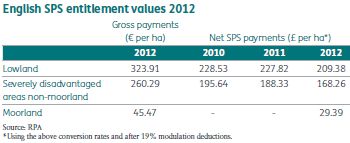The currency conversion rate for the single payment scheme has now been set at its lowest rate since 2008, however the claim validations are significantly ahead of last year's schedule.
Conversion rate for 2012
The rate for converting the 2012 payment is €1=£0.79805. This was the official European Central Bank rate on 30 September which fixes the value for 2012 payments. The rate is just under 8% less than last year's figure of £0.86665. It is the lowest conversion rate since the £0.7903 seen for the 2008 single payment scheme (SPS). A low figure indicates a weak euro and strong pound. Each euro buys fewer pounds and thus the SPS payment will be lower in sterling terms.

Modulation rates in the UK are unchanged in 2012 compared with 2011. The actual payments can now be calculated in Scotland and Wales for 2012 but in England the calculation of entitlement values is undertaken from scratch each year and the rate can vary depending on how many entitlements are claimed.
The adjacent table shows the actual payment farmers will receive in England based on the 2012 conversion rate. This is after modulation at 19% (ignoring the €5,000 threshold for EU modulation). This is compared to the payment for the last two years on a hectare of arable land (i.e. assuming a full history of arable area payment scheme claims in the reference period). England has now completed its transition to flat-rate regional payments and for 2012 onwards there is no historical element in English entitlements. Thus all entitlements within a region are now paid at the same rate.
Entitlement statements for 2012 have been available to view online since December. Those that made paper applications to the 2012 SPS will receive their statement in January 2013 through the post.

2012 payments
All the GB payment agencies have got a good proportion of 2012 single payments out to farmers. In England, the Rural Payments Agency (RPA) achieved its target for the whole of December on the first banking day (3 December). More than £1.38bn was paid (84.6% of the total) to 95,000 farmers (91.4% of customers). Those claimants who are unlikely to be paid in December should have been contacted by the RPA explaining the delay. In Scotland, around 14,200 claimants (approximately 70% of total) received their single farm payments on 3 January. This is an increase of around 4% on 2011. This was worth £303m.The Welsh Government had previously committed to pay 91% of claimants on the first day and appear to have achieved this target.
Dual use
The RPA is continuing its dual use information gathering exercise with a number of letters having been sent out to SPS claimants that the RPA has identified. Duel use is when a different business to the SPS claimant is claiming for the environmental scheme on a parcel of land. It is thought that the land occupant, the one who has the land within their holding should be responsible for both claims, but in (short-term) tenancy arrangements, this need not necessarily be the case as long as the occupant meets the environmental conditions on behalf of the claimant. The RPA will be looking for evidence that both parties can deliver their obligations under their respective agreements. The number of arrangements being surveyed is thought to be somewhat less than last year.
The spring Agricultural bulletin reported on the findings from the original exercise. This survey is part of Defra's ongoing campaign to allow dual use to continue. It has to have evidence to convince the EU auditors that it is satisfactory for one party to claim the SPS while someone else uses the land for agri-environmental schemes. If Defra loses the argument then dual use could be outlawed at any point. Although not officially confirmed, it seems fairly clear that it can continue for the 2013 scheme.
Soil protection reviews
It is a requirement for all SPS claimants in England to have completed a soil protection review (SPR). Lack of an up-to-date SPR is one of the main causes of cross-compliance penalties (in fact the SPR is often the first thing an inspector asks to see). Section 4 of the SPR requires any access to waterlogged land to be recorded. There had been no shortage of such land throughout last year, and we remind people to keep their records up to date. This must be updated by 31 December each year. Confusingly, the actual recording booklet is titled Soil Protection Review 2010 – but this continues to be the one to use. Defra is considering a revised version for the SPR. As the current booklet includes space to cover the 2013 year it seems likely that the revised version will apply for 2014.
The content of this article is intended to provide a general guide to the subject matter. Specialist advice should be sought about your specific circumstances.





